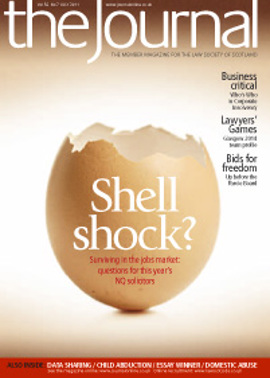Tobacco Act sound

I refer to Tom Johnston’s article (Journal, April, 44) “Burning a hole in the law”, in relation to the tobacco provisions in the Tobacco and Primary Medical Services (Scotland) Act 2010. There are two points in particular on which I would comment.
The first relates to para 8 of sched 1 to the Act. This provides that a person who has been issued with a fixed penalty notice in respect of an offence under the Act may make representations to the council as to why the notice ought not to have been given. The council may withdraw the notice if, having considered the representations, it considers the notice ought not to have been given. Mr Johnston notes that the council employs the person who has issued the fixed penalty notice and queries how this is ECHR compatible.
If the person is dissatisfied with the council’s decision then he or she can simply elect not to pay. In this case the only way to pursue a penalty for the alleged offence will be to take criminal proceedings before an ECHR- compliant criminal court.
The second point relates to the extent of s 4 of the Act (sale of tobacco products to persons under 18). Mr Johnston’s reading of this section is that “the offence is committed only by the person making the sale, not by the retailer”. He then notes the impact of such a reading on the likelihood of a registered retailer becoming liable to be subject to a tobacco retailing banning order.
I disagree with this interpretation of s 4. The decision as to whom it is appropriate to prosecute will be for the procurator fiscal, depending on the individual circumstances of the case. However, where tobacco has been sold to an under-18 on retail premises, both the owner of the retail business and the individual who conducted the sale are liable to be prosecuted in terms of s 4.
Mr Johnston states that vicarious responsibility cannot be implied and has to be expressly stated. I disagree. There is a presumption against vicarious responsibility for common law crimes, but the statutory imposition of such can be done either expressly or by implication. The form of words used in s 4 is common to many statutes regulating sale which have long been interpreted by the courts as imposing criminal responsibility on the seller in terms of contract, not just the person physically conducting the sale. As Gordon states at para 8.48 of vol I of The Criminal Law of Scotland (3rd ed):
“SALE. The commonest example of this form of vicarious responsibility is the case of sale. It is well recognised that the person who is regarded as the seller in the civil law of contract is also criminally responsible for a sale carried out on his behalf, even although the statute provides only that ‘No person shall sell’, and does not go on to specify ‘by himself or by his employee or agent’.”
Rosemary Lindsay, Solicitor, Scottish Government Legal Directorate, Food, Health and Community Care Division
Tom Johnston replies: Rosemary Lindsay is correct in pointing out that there have been instances, especially involving sales, where vicarious responsibility has been implied, and my article was incorrect in that respect; however, I wonder whether the establishment of a “crime by inference” would stand up in our post-ECHR society?
Section 4 of the 2010 Act is in similar terms to s 102(1) of the Licensing (Scotland) Act 2005, as originally enacted. There was no suggestion that the 2005 Act contained vicarious responsibility. That was clear in Scottish Government guidance. It was a source of criticism, particularly from ACPOS, and resulted in the reintroduction of vicarious “liability” (the term being incorrectly used in the amending legislation) via s 141B. Why, if the offence was already there?
The quoted passage in Gordon appeared in the first edition in 1967. We have moved on. At that time, for example, no one doubted the High Court’s declaratory power to create new crimes. I believe that someone charged with a “crime by inference” could mount a defence based on ECHR grounds.
The sad fact is that it should not be necessary to have this debate. The 2010 Act is typical of the botched, ill-thought-out legislation that we regularly get from Holyrood. How many MSPs debating the measure would have been aware of the point Ms Lindsay makes? If the Government intends an Act to contain vicarious responsibility it should say so in terms, instead of leaving us with a muddle.
In this issue
- Employee ownership: untapped succession solution for legal firms
- Cash call: cornering the council tax
- Tobacco Act sound
- Public profile
- Too much heat, not enough light
- Newly hatched
- Money matters
- Families in fear
- Get out of jail?
- People's choice
- E for explanation
- Who's Who in Corporate Insolvency
- Care with sensitive case papers
- Bullying: time to crack down
- SYLA reports successful year
- Middle East: back to growth
- Sheriff court auditor role to be restricted
- Law reform update
- From the Brussels office
- Solicitor's guide to internet porn
- Ask Ash
- Data sharing – the good practice guide
- Legal Risks – a conference reviewed
- Long-term solutions
- Removing hardship?
- 18 or 21?
- Lenders in the shade
- Demolition derby
- Time to come clean
- Scottish Solicitors' Discipline Tribunal
- Website review
- Book reviews
- Going the distance
- Fashion retailing comes to court






